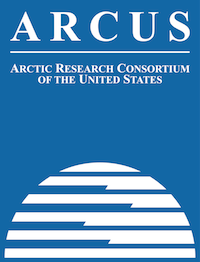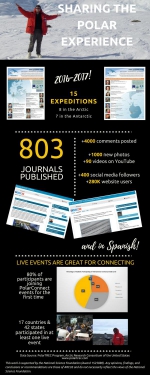ARCUS staff manage a diverse portfolio of projects to connect Arctic research across disciplines, organizations, knowledge systems, and geography. A few recent highlights include:

American Geophysical Union (AGU) 2017 Fall Meeting
We have been busy preparing for the upcoming AGU Fall Meeting in New Orleans, Louisiana:
ARCUS Annual Meeting - ARCUS' annual meeting will take place on Wednesday, December 13 from 6:00–7:00 p.m. Central Time in the Riverside I Room at the Hampton Inn & Suites New Orleans Convention Center. There will be a simultaneous videoconference for those who can't travel to New Orleans. ARCUS members and any others interested in Arctic research are invited to participate. More information is available here.
Arctic Research Community Reception - The Arctic Community Reception will be held Wednesday, 13 December from 7:00–8:30 p.m. Central Time in the Riverside I Room at the Hampton Inn & Suites New Orleans Convention Center. Members of the Arctic research community are invited to join in conversation, networking, and socializing. Co-sponsors for the event include: the International Arctic Science Committee, the Interagency Arctic Research Policy Committee, the University of Alaska Fairbanks, Ice911 Research, and the U.S. Association of Polar Early Career Scientists. More information is available here.
Community Meeting Room - ARCUS will again be hosting two Arctic Community Meeting Rooms to provide meeting space for groups working on Arctic research and education. These rooms are funded by the NSF-Arctic Sciences Section. If you would like to request meeting space, please fill out the online form here.
Guide to AGU Arctic Sessions - We have compiled an online list of Arctic-related sessions at AGU as a tool to help attendees to find Arctic-related sessions, talks and posters. The list is available [here]; If we have missed your session, email Lisa Sheffield Guy at lisa [at] arcus.org and we will add it.
ARCUS Presentations and Sessions – Finally, we hope to see you at one of ARCUS' posters, sessions, or related events!
New Webpage: Conducting Research with Northern Communities
ARCUS launched a new webpage, "Conducting Research with Northern Communities: Documented Practices and Resources for Productive, Respectful Relationships Between Researchers and Community Members."
Scientific research in the Arctic necessitates good communication and cooperation with northern communities. This new webpage is a compilation of resources, recommendations, and documented practices from a variety of organizations on working with northern communities. View the webpage here.
New Project: Empowering Arctic Indigenous Researchers
ARCUS and the Inuit Circumpolar Council Alaska are collaborating on a new pilot project called "Empowering Arctic Indigenous Scholars and Making Connections". The project will feature two seminar/webinars in Washington, D.C. during spring of 2018 featuring leading Arctic Indigenous scholars. While the scholars are in D.C. for the seminar, we will facilitate meetings with officials at key U.S. government agencies, non-governmental organizations, and other groups, where the scholars will be able to share their interests, learn of available resources, build collaborative relationships, and provide on-the-ground perspectives. Funding is provided by the National Science Foundation-Arctic Sciences.
Robert Rich, ARCUS Executive Director, and Carolina Behe, Inuit Circumpolar Council Alaska and ARCUS Board Member, will lead the project with guidance from a selection committee.
For more information, contact Lisa Sheffield Guy, Project Manager, at lisa [at] arcus.org.
Arctic Research Seminar Series
The ARCUS Arctic Research Seminar Series invites leading Arctic researchers and community leaders to Washington, D.C. to share both in person and via simultaneous webinar the latest findings in Arctic research and what they mean for decision-making. The events are free, open to the public, and highly rated by participants. Upcoming seminar/webinars include:
- 12 February 2018: Roberto Delgado and Andrea Marques Horvath (U.S. National Institute of Mental Health NIMH) - Roberto and Andrea will highlight the National Institute of Health's support of mental health research in the Arctic, focusing both on suicide prevention initiatives of the Arctic Council as well as new collaborations to reduce the burden of suicide among Alaskan Native youth.
- 29 March 2018: Matthew Jull (Assistant Professor for the University of Virginia School of Architecture) - Matthew is Co-Director of the Arctic Design Group; his research focuses on architecture and urban design within the frame of extreme climates.
If there are any topics or research areas that you would like to see featured in a future Arctic Research Seminar, please contact Brit Myers at brit [at] arcus.org.
More information, registration, and archives of past seminars can be found here.
PolarTREC: Teachers and Researchers Exploring and Collaborating

Outreach results from the fifteen 2016 teacher-researcher teams is highlighted in Figure 1. We also encourage you to take a moment and read teachers' "Experience Reports", in which they reflect on the value of the PolarTREC experience.
As the 2017 season comes to a close, one Antarctic team remains in the field at the South Pole Station, working with the IceCube research project. Anyone can follow expeditions here. In addition, preparations for Antarctica Day on 1 December 2017 are underway. ARCUS will be celebrating Antarctica Day by hosting a live, real-time event with PolarTREC teacher Lesley Anderson from the South Pole Station on Monday, 4 December. More information and registration is available here.
In early October, the application period for educators to apply to the next round of PolarTREC projects closed. We received over 150 applications and are currently working with a selection committee on final selections.
Keep up with PolarTREC events through the website, PolarTREC on twitter at @PolarTREC, the PolarTREC Facebook group, or by joining the Polar Education Mailing List.
PolarTREC is funded by NSF Office of Polar Programs (awards 1525880 & 1630463). Additional funding was received through NASA for teachers in 2016 and 2017 who worked with Operation IceBridge. The University of Alaska and NOAA Teachers at Sea supported a teacher in 2016.
Anchorage Arctic Research Day 2018
For those who live or work in Anchorage, Alaska, save the date for the 2nd Anchorage Arctic Research Day 2018, which will take place on Thursday, 26 April 2018 at the Anchorage Museum. Organized by ARCUS, the University of Alaska Anchorage, the Institute of the North, and the Anchorage Museum, this event will include a broad range of speakers on Arctic research and offer great opportunities for networking. Updates will be announced via ArcticInfo. For more information, contact Betsy Turner-Bogren at betsy [at] arcus.org
Sea Ice Prediction Network (SIPN)
An update on SIPN activities, including the 2017 Sea Ice Outlook season, an upcoming meeting at the AGU Fall Meeting, and a newly-funded "SIPN2" project, is available in the Arctic Systems Science news section of this issue.
Study of Environmental Arctic Change (SEARCH)
ARCUS staff provide a variety of project office support tasks for the SEARCH program. An update on SEARCH activities from SEARCH Executive Director Brendan Kelly is available in the SEARCH News section of this issue, and a schedule of SEARCH events at the AGU Fall Meeting can be found through the SEARCH website.
Keep up with ARCUS and Arctic Events
Stay in touch with ARCUS and the broader Arctic research community through these communication tools:
ARCUS Website
ARCUS on Twitter
ArcticInfo Mailing List
Polar Education Mailing List
Witness Community Highlights
Witness the Arctic Newsletter
Arctic Calendar
